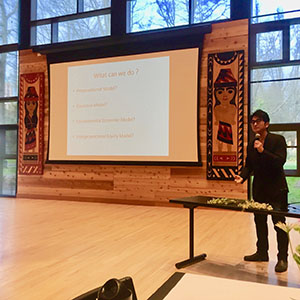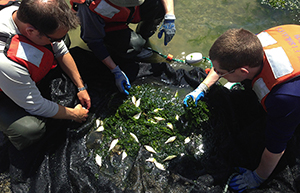
On April 3rd, 2018 the University of Washington Superfund Research Program co-hosted a workshop titled “Fish and Future: An Inter-Generational Dialogue on Food, Health, and Environment in the Pacific Northwest.” The free event brought together members of Indigenous communities, students, and academics from the US and Canada to share perspectives on issues related to climate change, pollution, and the management of local fisheries. Emphasis was on sharing knowledge from traditional and western sources and identifying policy gaps. The goal was to chart a plan for an ongoing exchange of Indigenous and western-based sciences and to support communities in the development of strategic adaptation and action plans. Presentations ranged from oceanography to anthropology and included a live reading of a script created from interviews with local farmers, ranchers and tribal members involved in a dispute about water rights in the Skagit Valley.


